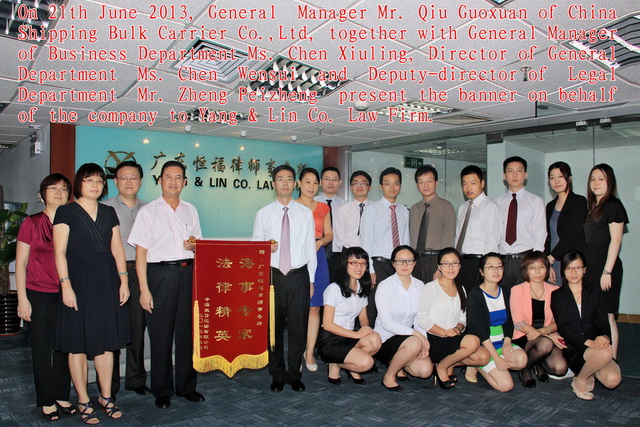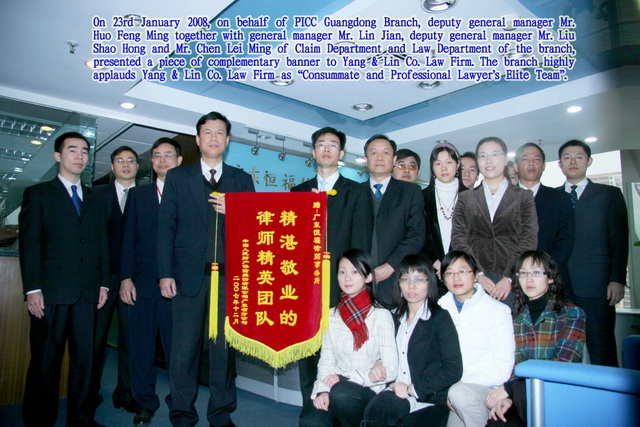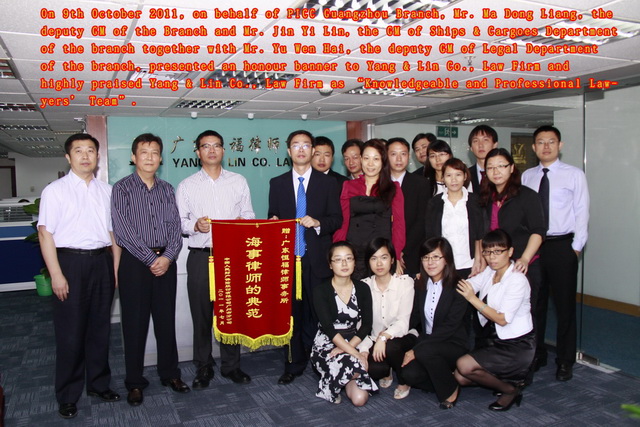In response to the call of the central government for developing foreign-related legal service, Guangdong Lawyers Association held a third session of training for the foreign-related leading talents of Guangdong province, in order to encourage and support Chinese lawyers and law firms to “go global”, to polish the legal services and competence of handling international business for Guangdong foreign-related lawyers, and to promote the coordinated development of the legal services industry in Guangdong-Hong Kong-Macao Greater Bay Area. Judy Lin, vice director of this law firm, was elected to participate in the international arbitration training for one week on behalf of Guangdong foreign-related law firms.
This training was a combination of theoretical study and department visits. The opening ceremony was held on the afternoon of the first day. The vice chair of the Guangdong Lawyers Association, Mr. Tong Xin, delivered an opening remarks to cheer up all the foreign lawyers, announcing “the golden opportunities for foreign-related lawyers were on the corner.” His inspiring speech instilled confidence and enthusiasm in the foreign lawyers present.

Opening Remarks by Vice Chair Tong Xin
The first speaker was barrister Ms. Liao Yuling, Justice of the Peace in Hong Kong (also a lawyer in England and Wales who held a position as a deputy judge of the Hong Kong District Court, and a mediation expert in Hong Kong). She addressed on the theme "Multi-Disputes Resolution in Hong Kong". The lecture was greeted by great interest and active interaction from the lawyers present.

Lecture by Barrister Ms. Liao Yuling

Lecture
After the lecture, Benchmark Chambers International arranged a wonderful dinner for the lecture attendees. The attendees had profound interaction and thought exchanges with leaders of Guangdong Lawyers Association and Benchmark Chambers International, as well as the speakers invited for the training. The dinner also arranged to celebrate the birthdays of two lawyers.


Dinner
On the second day, Mr. Liang Qikang from King & Wood Mallesons, gave a lecture titled Several Practical Issues on IPO and M&A in Hong Kong, and Mr. Liu Qiao, deputy secretary general of the Hong Kong International Arbitration Center (HKIAC), gave a lecture titled Operation Mechanism of HKIAC and International Arbitration Hot Issues. Mr. Liang believed that China had 182 IPOs in 2018, among which 178 enterprises listed on the Hong Kong Stock Exchange, accounting for 55% of the total. The reform of the listing system in Hong Kong would drive more and more mainland companies to list in Hong Kong. Hong Kong Stock Exchange had become an important pillar for China's science and technology enterprises to make equity financing. It was a good opportunity for foreign-related lawyers in Guangdong Province. We should make full use of the trend of going public in Hong Kong, and understand the IPOs and M&A in Hong Kong for mainland enterprises in order to provide professional legal services for those enterprises and to help the the Grater Bay Area enterprises “go global”.

Lecture by Lawyer Liang Qikang
On the third morning, Professor Xi Chao, Associate Dean of the School of Law of the Chinese University of Hong Kong, gave a lecture in two languages about the judicial system of Hong Kong and the similarities and differences between Hong Kong and the Mainland in the trial system. His accessible lecture helped the attendees have a clear and systematic understanding of Hong Kong Justice System and differences in the trial proceedings between Hong Kong and the Mainland. His lecture laid a theoretical foundation for Guangdong foreign-related lawyers to develop legal business in Hong Kong. After the lecture, Professor Xi Chao issued a certificate of completion for all attendees who participated in the training.

Completion Ceremony
The special curriculum of this training class was highly targeted, effective and forward-looking. Dr. Judy Lin (the top ten foreign-related lawyers in Guangzhou) was very impressed, and she believed "the Greater Bay Area really needs to improve international business dispute resolution mechanism, to build international arbitration center, to support exchanges and cooperation among arbitration and mediation agencies at the three places, and to provide arbitration and mediation services for economy and trade in Guangdong, Hong Kong and Macao." In order to give full play to the advantages of Hong Kong International Arbitration Center and Mediation Center, Dr. Judy Lin suggested a pilot test in the Grater Bay Area: 1) allow Hong Kong and Macao arbitration institutions to conduct arbitration business in the Mainland and allow Hong Kong and Macao mediation centers to settle in Shenzhen or Guangzhou; 2) the Provincial Justice Department takes the lead, with the support of Guangdong Lawyers Association, to construct the arbitration and mediation center in the Greater Bay Area, to formulate rules on accrediting arbitrators and mediators, and arbitration and mediation systems agreed in Guangdong, Hong Kong, and Macao; 3) establish Grater Bay Area arbitration institution or mediation center in Guangzhou. In this way, it’s effective to dissolve various disputes in Guangdong, Hong Kong and Macau, reduce judicial costs and prompt the economic development of the Greater Bay Area.



In the following two days, the training attendees visited Steven Wong & Co and Woo Kwan Lee & Lo and other well-known law firms in Hong Kong. They had practical discussions with Hong Kong lawyers from different fields to learn more about Hong Kong legal system and the internal operation mechanism of Hong Kong law firms. They also visited the Hong Kong Bar Association, the Hong Kong International Arbitration Centre, China International Economic and Trade Arbitration Commission Hong Kong Arbitration Center, and the China Maritime Arbitration Commission Hong Kong Arbitration Centre. During the visit, they learned about operation mode and advantages of arbitration and mediation in Hong Kong, discussed the dispute resolution services in Greater Bay Area, and exchanged views on the similarities and differences between Hong Kong and Mainland arbitration.


Visit to Hong Kong Bar Association

Visit to China International Economic and Trade Arbitration Commission Hong Kong Arbitration Center
After the training, Dr. Judy Lin also took a lead to visit experts and friends from the legal and shipping industry in Hong Kong to make a cordial exchange, to strengthen ties and lay the foundation for future cooperation.



What’s more, Dr. Judy Lin told us proudly that she was honored to be appointed as the deputy monitor during the one-week training event. Although she felt a little stressed during the special period, she successfully completed the tasks consigned by Guangdong Lawyers Association under the guidance of monitor Peng Bo and the help of other attendees. She not only fulfilled her duties and responsibilities as a deputy monitor, but also forged a profound friendship with the lecturers and other attendees. She expressed her expectation of future win-win cooperation with them. At last, she sincerely appreciated Guangdong Lawyers Association for holding this training as a platform for study and exchange. She hoped that more such trainings could be held to strengthen the international influence of Guangdong foreign-related lawyers, to enhance the professional level and competitiveness of foreign-related lawyers in Guangdong Province, and to better protect the “going global” Chinese enterprises.




